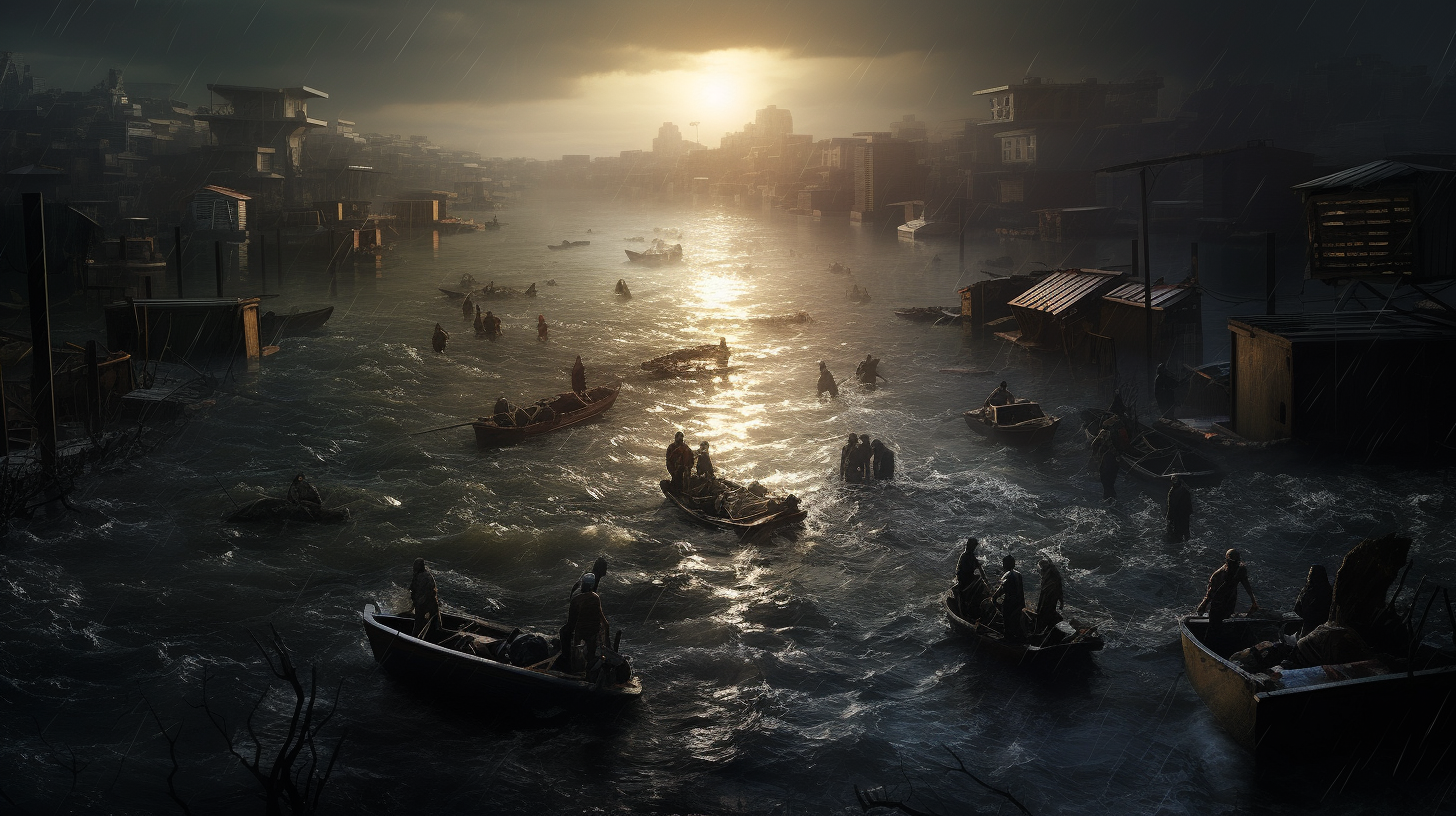In the fateful shadow of a world scarcely recognizable, humanity clamors through the debris of what was once a civilization in balance with nature. The Great Exodus, this era’s most harrowing saga, defines an epoch where swathes of humanity are compelled to wander, not for conquest or exploration, but for mere survival. This immense wave of displacement, a direct consequence of the rapacious disregard for our environmental sanctity, has become the norm rather than the exception.
Vast stretches of land, once brimming with biodiversity and human enterprise, now forsaken graves to the avarice of our past. Where the laughter of children once mingled with the whispers of the wind, only the howls of desolation prevail. From the once fertile soils of the Great Plains now lost to pestilence and drought, to the inundated streets of coastal megacities, the stage is grand, and the players, countless.
Seekers of refuge, the marred faces of resilience, bear witness to histories untold. Clutching the remnants of their forsaken lives, they journey, trudging toward a horizon that offers no respite, no redemption. These are not the hopeful voyages documented by ancestors or the triumphant chronicles of old. This exodus is an odyssey of sorrow, a testament to the precarity of our times.
Displacement en masse, mirrored in the abandoned homes now hosting only memories, is not merely a phenomenon; it is the portrait of our era. Where green pastures turned to dust bowls, gulped by the unrelenting sun, and the stubborn sea claims more land each day, humanity scurries like leaves before the storm. The Southern Hemisphere, once teeming with vibrant cultures and diverse ecologies, now stands as a poignant reminder of nature’s unyielding power when pushed beyond its brink.
The narrative might seem like the morbid fable spun by twisted minds, yet it unfolds with terrifying tangibility. Within this dystopia, the facade of technological prowess crumbles, revealing the vulnerability that we sought so fiercely to shroud. We imagined ourselves to be masters of the Earth, bending nature to our will, but the tables have turned – nature now bends us to the precipice of despair.
But amidst this chaos, there is a grim allure. The stories of courage and resignation, of sacrifice and selfishness, sew together the tapestry of human experience. The Great Exodus is not just about loss and lament – it’s a chronicle of adaptation, the eerie song of evolution played in a minor key. It sings the resilience of communities that fashion shelters from the detritus of a world that once was, the ingenuity of survival in lands that have grown hostile to the touch.
Consider the coastal nomads, sailing makeshift rafts across the deluged ruins of their former cities, weaving through the skeletons of skyscrapers. Or the desert drifters, roaming in caravans rigged with salvaged solar panels and relics of technology, seeking shelter in the fleeting shade of skeletal overpasses that stand as mute witnesses to better days. These are but glimpses into the myriad lives that surge forth, fueled by the instinctual drive to persevere in the odds of ultimate adversity.
The question is no longer about prevention but rather adjustment to the inexorable dusk. The tools of this adjustment are not born of hope, for that is a luxury squandered and lost. They are born of necessity, tenacity, and the brutal realization that we now dance on the knife-edge of the human epoch.
This narrative is far from complete, written in the sand and washed away with each relentless tide. Yet it commands us to gaze not away but deeper into the abyss to confront the monsters of our own making. As we pen the successive chapters of The Great Exodus, let them not be mere elegies of extinction but beacons, however dire, that illuminate the unrelenting truth of our shared predicament.
